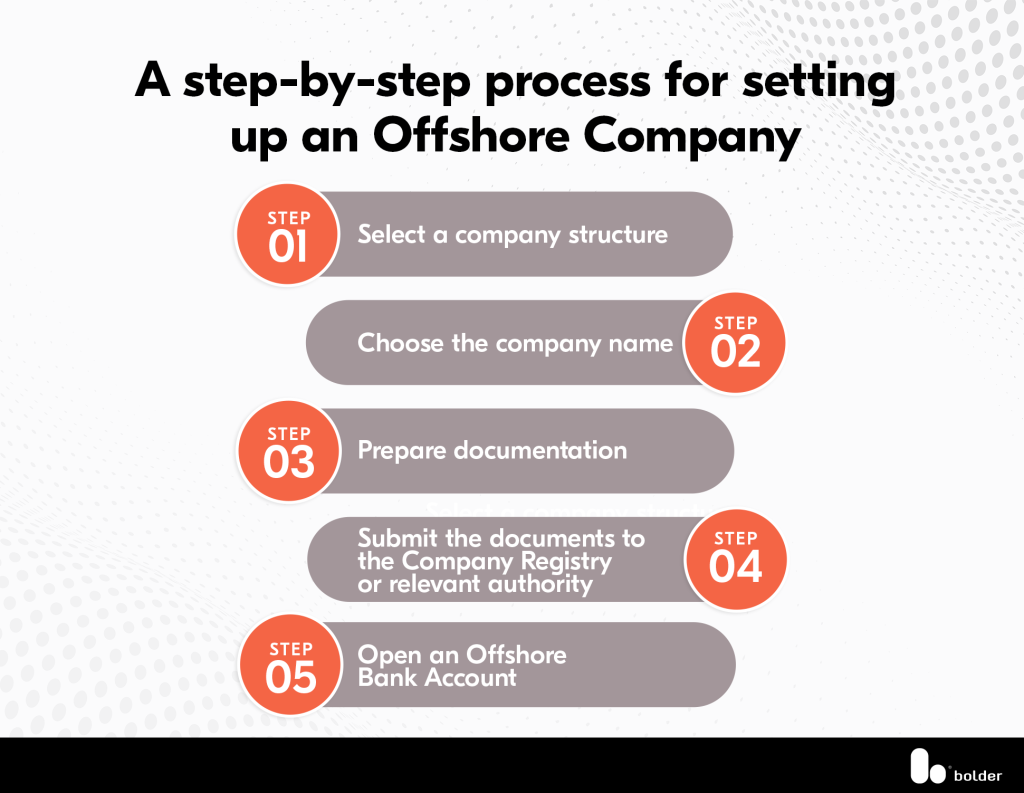How Long Do Offshore Company Formations Really Take? What to Expect
Demystifying Offshore Firm Formations: Just How They Run and What to Anticipate
Offshore company formations can appear facility and enigmatic. Offshore Company Formations. These entities, frequently established for tax obligation advantages and personal privacy, operate under special legal frameworks. Business owners may find themselves maneuvering through a puzzle of laws and conformity requirements. Comprehending the ins and outs is necessary for success. What are the genuine advantages? What are the possible challenges? A closer evaluation reveals the subtleties that might impact decision-making considerably
Understanding Offshore Firms: Kinds and meanings
Offshore firms are entities developed in a jurisdiction beyond an individual's or business's key nation of home, commonly for functions connected to tax obligation optimization, property defense, or governing benefits. These firms can take different forms, including restricted obligation firms (LLCs), international business firms (IBCs), and offshore trusts. Each type serves certain functions and attract different requirements.
Limited liability companies offer proprietors with security from individual responsibility, while international company firms are prominent for their flexibility and minimal coverage needs. Offshore trust funds, on the various other hand, are used mostly for estate planning and asset protection.
The choice of jurisdiction considerably influences the firm's operations, as some places supply more beneficial lawful frameworks and privacy securities. Offshore Company Formations. Understanding the distinctions between these kinds is important for companies and individuals thinking about overseas frameworks, as each option carries different ramifications for administration and compliance
The Benefits of Establishing an Offshore Business
Establishing an offshore business can give numerous benefits, particularly for those seeking to boost their financial methods and shield their assets. One considerable benefit is tax obligation optimization; many jurisdictions supply beneficial tax obligation prices or exemptions, enabling services to maintain even more profits. Furthermore, overseas firms can offer a layer of personal privacy, securing the identifications of proprietors and investors from public examination.
An additional advantage is possession security. By positioning possessions in an offshore entity, individuals can safeguard their wide range from potential legal cases or political instability in their home countries. This structure additionally assists in global service procedures, enabling less complicated access to international markets and varied clientele.
The facility of an offshore company can improve reliability and status, appealing to customers who value global service methods. On the whole, these advantages make overseas firm formations an attractive choice for companies and people intending for monetary growth and security.
Secret Factors To Consider Before Creating an Offshore Entity
Prior to forming an overseas entity, several essential elements have to be evaluated. Lawful compliance needs, tax ramifications and advantages, as well as territory selection, play a considerable role in the decision-making process. Comprehending these factors to consider can help individuals and organizations navigate the intricacies of offshore company formations successfully.

Lawful Conformity Requirements
When considering the development of an overseas entity, understanding legal conformity demands is necessary to assure adherence to both worldwide and neighborhood laws. Prospective company owner have to familiarize themselves with regulations controling company enrollment, reporting obligations, and operational requirements in the selected jurisdiction. This consists of verifying the legal needs for shareholders and supervisors, in addition to ensuring conformity with anti-money laundering (AML) and know-your-customer (KYC) regulations. Furthermore, organizations must remain conscious of any kind of licensing requirements certain to their industry. Engaging neighborhood legal and monetary specialists can offer useful understandings, making certain that all necessary documents is prepared and sent correctly. Eventually, extensive expertise of legal conformity aids mitigate dangers and promotes a lasting offshore operation.
Tax Ramifications and Advantages
Countless entrepreneur consider the tax ramifications and advantages of creating an overseas entity as an essential aspect in their decision-making procedure. Offshore companies can offer significant tax advantages, such as decreased corporate tax obligation prices, exemption from particular local tax obligations, and the ability to defer tax obligations on foreign revenue. These benefits can result in improved earnings and money flow, making overseas structures appealing for global company procedures. Furthermore, the possibility for tax obligation treaties may further reduce tax obligation liabilities. It is crucial for business owners to understand the complexities entailed, consisting of compliance with both worldwide and local tax obligation guidelines. Engaging with tax obligation experts is recommended to browse these ins and outs efficiently and ensure ideal tax obligation planning techniques.
Territory Selection Variables
What elements should one consider when picking a jurisdiction for overseas company development? Key considerations consist of tax performance, regulatory environment, and political security. Jurisdictions with favorable tax regimes can greatly affect success. The regulative landscape should use flexibility and convenience of conformity, enabling for reliable business operations. Political security is crucial, as it assures the security of assets and continuity of procedures. Additionally, the reputation of the jurisdiction can impact client trust and business connections. Access to financial solutions and the schedule of professional assistance services are likewise crucial. Understanding regional regulations pertaining to possession, coverage, and personal privacy needs is essential to ascertain that the offshore entity aligns with the business proprietor's objectives and legal obligations.
Possession The Refine of Establishing an Offshore Firm
Setting up an offshore firm includes a series of critical steps that require mindful preparation and compliance with international regulations. A specific must pick an ideal jurisdiction that aligns with their organization purposes and provides favorable tax advantages. Following jurisdiction choice, the next step is to pick an unique company name and prepare the essential paperwork, including write-ups of unification and shareholder agreements.
When the documents is ready, it should be submitted to the appropriate authorities together with the called for costs. After authorization, the business will get a certification of incorporation, officially developing its legal presence. The individual have to then open a Read Full Article company bank account to help with financial deals.
Ultimately, maintaining an offshore business entails sticking to ongoing conformity requirements, such as annual reporting and tax obligation commitments, which differ by territory. Therefore, comprehending each step is crucial for a successful offshore company formation.
Governing and lawful Framework for Offshore Firms
While establishing an offshore company can supply substantial advantages, it is crucial to steer via the intricate lawful and regulative structure that regulates such entities. Each jurisdiction has its own set of regulations that determine whatever from business formation to taxation and conformity needs. These policies are developed to prevent prohibited tasks, such as money laundering and tax obligation evasion, and frequently require thorough documentation and openness.
Crucial element of this structure include the necessity of assigning regional directors, keeping an authorized workplace, and sticking to annual reporting obligations. In addition, numerous territories impose specific licensing requirements for sure company tasks. Recognizing these legal terms is essential for making certain conformity and mitigating dangers connected with charges or legal conflicts. Involving with lawful professionals who specialize in offshore companies can help in maneuvering with this detailed landscape, ultimately helping with a effective and certified overseas company operation.
Typical False Impressions About Offshore Business
Lots of people hold misconceptions regarding overseas firms, commonly corresponding them with tax obligation evasion and unlawful activities. However, it is essential to recognize that these entities can operate legitimately within a structure developed for reputable business methods. Clearing up the legal standing of offshore business can help eliminate these myths and advertise a more exact understanding of their objective.
Tax Obligation Evasion Myths
Despite the expanding popularity of overseas firms, false impressions concerning their use for tax evasion linger. Several people erroneously think that establishing an overseas entity is entirely a means to prevent taxes. Overseas business are typically utilized for reputable functions, such as asset defense, worldwide business development, and investment diversification. The perception that all overseas activities equate to immoral tax evasion overlooks the intricacies of worldwide tax regulations and compliance needs. In addition, the large majority of overseas jurisdictions have actually applied actions to battle tax evasion, advertising openness and information exchange. This mischaracterization can hinder legitimate services and financiers from exploring the possible benefits of offshore firm formations while bolstering a negative stigma surrounding these entities.
Legal Status Clarified
The lawful standing of offshore companies is usually misunderstood, causing a selection of misunderstandings. Many believe these entities operate in a legal grey location, assuming they are naturally unlawful or underhanded. Actually, overseas companies are genuine organizations formed under the legislations of certain territories, made for numerous reasons, including possession defense and click here to read market development. Another common mistaken belief is that overseas firms escape taxes completely; however, they are subject to the regulations and tax obligation responsibilities of their home countries. Furthermore, some people think that overseas business can be easily exploited for cash laundering or unlawful activities. While abuse can take place, the majority of jurisdictions apply rigorous conformity and openness legislations to alleviate such dangers, making sure that offshore business operate within lawful structures.

Handling and Running Your Offshore Company Successfully
Effectively managing and running an overseas firm calls for a strategic technique that stabilizes compliance with neighborhood regulations and the search of business goals. Effective overseas monitoring involves recognizing the jurisdiction's tax obligation legislations, reporting requirements, and operational guidelines. Employing neighborhood professionals, such as accountants and legal consultants, can offer very useful insights into traversing these complexities.
Additionally, developing clear communication channels and operational methods is essential for preserving effectiveness. Using innovation for project management and cooperation can boost efficiency, while regular performance examines assurance alignment with strategic purposes.
Maintaining durable financial documents is necessary, as openness cultivates trust fund with stakeholders and complies with global criteria. Being versatile to adjustments in regulations or market problems allows overseas companies to pivot successfully, ensuring long-term sustainability and development. By adhering to these principles, business owners can optimize the benefits of their offshore ventures while mitigating threats.
Often Asked Inquiries
Just how much Does It Price to Preserve an Offshore Firm Yearly?
The expense to maintain an overseas company every year varies substantially, generally varying from $1,000 to $5,000, depending on jurisdiction, solutions needed, and conformity obligations. It is necessary to consider extra costs for specific demands.
Can I Open Up a Checking Account for My Offshore Business Remotely?
Opening a savings account for an overseas company remotely is generally possible. However, requirements may vary by jurisdiction, frequently demanding documents and verification processes, which can make complex the remote application experience for people.
Are There Specific Countries Known for Easier Offshore Business Formations?
Certain nations, such as Belize, Seychelles, and the British Virgin Islands, are renowned for their structured procedures and favorable guidelines concerning overseas business developments, bring in entrepreneurs looking for performance and confidentiality in organization operations.
What Sorts of Businesses Are Best Matched for Offshore Firms?
Specific organizations, such as financial investment, working as a consultant, and ecommerce firms, typically take advantage of overseas business as a result of tax obligation advantages, privacy, and governing versatility - Offshore Company Formations. These entities generally grow in jurisdictions that advertise positive company settings
Exactly How Can I Make Certain Compliance With Neighborhood Laws When Running Offshore?
To guarantee conformity with neighborhood regulations when operating offshore, it is important to involve lawful professionals, perform comprehensive study on jurisdiction laws, and maintain clear financial documents, therefore minimizing threats connected with non-compliance.
